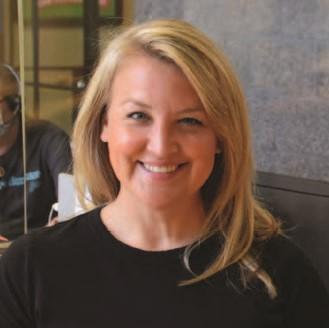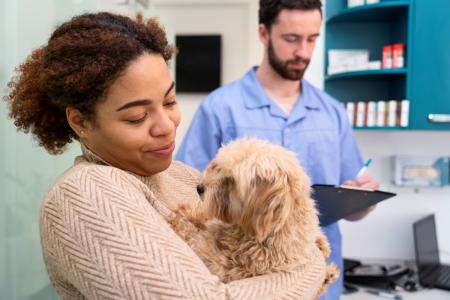In the past, animal mistreatment and neglect or abuse of people were usually perceived as two separate issues. More recently, an increasing amount of research has shown a direct link between human and animal mistreatment. Professionals in animal law enforcement and human social work have found that difficult life circumstances and mental health life challenges are at the root of many of these linked cases.
In light of this new research, there is a growing field of social workers, including veterinary social workers, who seek to address the social and human drivers of animal mistreatment while providing support to people who are facing difficult circumstances. y also provide support for pet owners, veterinary professionals, shelter staff, animal control officers, and others working with animals and people in high stress environments.
To get a better understanding of the life of a veterinary social worker and how animal law enforcement can collaborate with them, we decided to go straight to the source and conducted an interview with someone who works directly in this field, Kelly Bremken.
Kelly is the veterinary social worker with the Oregon Humane Society with more than 17 years of experience working in animal welfare for the Arizona Humane Society, Humane Society of the Treasure Coast, Seattle Animal Shelter, and the Oregon Humane Society. Bremken graduated in 2021 with a master’s degree in Social Work from the University of Tennessee and has a certification for veterinary social work.
The interview below has been edited for length and clarity.
Can you explain what veterinary social workers do and walk us through your regular day?
Social workers are the largest mental health provider group and we do so many different jobs, which is what I like about it. There are lots of social workers who get a certification in school social work, and they work in a school with kids. Or there are people who get certified for trauma and grief work, and they work solely with people for trauma and grief. And then there is what I do, veterinary social work, which is sort of a newer idea.
As a veterinary social worker, I split my time between the shelter and our community vet hospital. At the community vet hospital, I am an embedded veterinary social worker, which means if someone comes to me because they are going through end-of-life discussions with their client and that client is having severe grief and they have questions relating to discussing euthanasia with children, that is when I can come in with my resource list and my books to help. That helps our veterinary staff, so they don’t have to be the front line of absorbing that. Most veterinarians or animal control officers aren’t trained in loss and trauma, but I am, so that makes it easy for me but also takes the weight off of them.
My expertise lies in how to help the animal that a person is attached to. So, overall, what we are hoping for is that by having a veterinary social worker within a shelter, we can improve the life of people so that it improves the life of pets.
As an animal control officer (ACO), you want to ensure that a family or individual has all the resources they need to care for their pet but oftentimes that goes hand in hand with observing if they have all the resources they need to take care of themselves as well.
The hard part for an ACO is coming across people who need services or assistance and feeling as if they are only addressing an animal need and then walking away [without helping the person]. That is why it is so important and beneficial to have a social worker on staff or standing by with a resource list of referrals to social service agencies to further assist people.
Why do you think having a veterinary social worker involved in animal cruelty and neglect cases is so important?
We are trained to recognize some of the “people” issues that go along with these cases. I think we know now from The Link which is the link between human and animal violence- this idea that there are other social service problems happening in those environments a lot of the time. A veterinary social worker helps address those issues, so the ACO going out on that call doesn’t have to carry that burden of worry about it.
The other side to that is that sometimes, what we first see as abuse and neglect could actually be someone not having access to care. This isn’t just about the inability to afford vet care, but includes the cultural aspect of looking at pets differently; Other barriers include not having transportation or living in an area that doesn’t have resources or having a language barrier and not knowing how to get help. It is really easy to get into this mindset that the worst-case scenario can happen because we have seen it happen. I never want to say it’s definitely not abuse or neglect because sometimes it is, but intentional neglect and intentional abuse are rarer than we think. The truth however, is a lot of times that it’s a lack of access to care and usually some type of barrier there that we aren’t aware about.
The hard part is, I am a social worker but I am not magic. Having a social worker will not solve all the problems and it will not mean that everyone will get all the resources that they need, but it is a great tool in your toolbox to help a case or assist with educating and connecting with others. There is a lot a social worker can add, just understand they aren’t magic!
Where we work will help shape the work that we do. I can tell you what I do and introduce you to someone who works in Tampa who works in an open admissions place with animal control officers in a shelter, or even veterinary social workers working in a small foster based organization; every single one of us does the same job but it’s very different. In the same way that I think animal control officers are different depending on their jurisdiction, how much enforcement power they have, the size of jurisdiction they have to cover- those things all impact the job we actually get to do or the things we get to put in place. So, I would say this is my first year here and it is a big learning curve to figure out what can I actually do, what can I impact, and what does this community or group need? And I think that is the most important part when you start a new role in veterinary social work- there should be some sort of a needs assessment.
I think the other hard part is how a veterinary social worker position is funded is always difficult for every group. There are lots of grants and teams out there that helped to fund my position. Maddie's Fund and a couple of other animal welfare groups are helping fund some of the roles. I think an easy way to get started is to get an intern and to have someone work in the space even if you only pay them a stipend; it’s a fraction of the cost and you can figure out what this role could really do for you.
Where do you see the field of veterinary social work going in the future and how can Colorado better integrate this growing field into the work we do here?
University of Denver has a human animal bond certificate program, which is a social work program. There is an institute for human animal connection, and they provide certification as well as humane education or animal assisted therapies. Additionally, The International Association for Veterinary Social Workers has a directory that can point you in the direction of anyone working in that area in Colorado.
It’s the idea that having a social worker is exciting because it will shift our culture to be more inclusive and more focused on the system in which we work. That is a hard shift and a hard change, so know that it will shift the culture but also understand that there are going to be some pain points when you are making that change.
What are some signs to help BAP agents and law enforcement identify when to call a veterinary social worker to help with a case?
The key there is knowing that the people in that specific situation need additional resources or help but not knowing where to go with it. Because truthfully, officers on the ground know a lot about the system and so they usually know who to refer to; but it can be very helpful to sit down with someone in a confidential setting with a social worker and be able to say “here is the client I am helping and here is what I saw, is there anything else I should have offered them or be doing for them?” I think it is a good sounding board and I also think your social worker will be plugged into social services in a way that your officer isn’t.
In cases where I am getting referrals, it’s because there is an adult in the home who doesn’t seem to be taking care of themselves and that officer isn’t sure whether to report them to adult protective services or elder care. That is normally where I get called in, and honestly it is almost always yes if the officer asks me, I think it’s just they are just looking for a professional reassurance if it is the right direction because they understand that calling that agency is starting a chain of events.
I also have a list of therapists in our area who work with animal hoarding or who work with children who abuse animals. That way, I have a resource list of therapists to refer families to and I think officers find that very helpful so when they are citing a family or a child has been the one doing the abuse, at least there is a resource so it doesn’t feel like we are just fighting and walking away and hoping everything works out for them.
If you have a case that you think could be benefited by a veterinary social worker and/or are needing support within this type of work, feel free to contact Taylor Peterson at 720-241-1537 or Dr. Courtney Diehl at 303-775-3718 for resources available in your area.
Additionally, stay tuned for exciting developments within the BAP as we work towards hiring a social worker to assist our department and BAP agents with topics surrounding mental health and the link between human and animal mistreatment.

